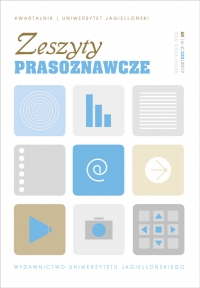ZNACZENIE PRAWA KARNEGO MATERIALNEGO W WYTYCZANIU GRANIC SWOBODY WYPOWIEDZI I WOLNOŚCI PRASY
THE SIGNIFICANCE OF THE SUBSTANTIVE PENAL LAW IN THE DELIMITATION OF THE FREEDOM OF SPEECH AND THE FREEDOM OF PRESS
Author(s): Piotr KosmatySubject(s): Media studies, Constitutional Law, Criminal Law, Human Rights and Humanitarian Law
Published by: Wydawnictwo Uniwersytetu Jagiellońskiego
Keywords: freedom of speech; freedom of press; journalist; media; Penal Code; Press Law;
Summary/Abstract: The following article provides an insight into the delimiting function of the Penal Code with regard to the constitutional rights of freedom of speech and press, which is dealt with much less frequently both by doctrine and jurisdiction than the civil law and administrative aspects of media activity. However, it has to be understood that the evaluative function of the norms of penal law do affect all forms of media activity. The study presents an attempt to determine the degree of influence of penal law on freedom of speech, aimed on the evaluation of its role as the ultima ratio legal means, which will establish a basis for determination of the degree of penalization of Polish press law. The study stresses the importance of the reciprocal function of penal law which not only limits the freedom of speech and press, thus allowing for the legal liability of journalists, but also secure their right to carry out their informative mission in an unobstructed way. The major focus of the following article are cases of undermining or breaching the limits set by freedom of speech, with their evaluation both within the bounds of Penal Code and other normative acts, such as Press Law or Minor Offences Code. Particular attention has been paid to the possibility of commitment of public slander and press libel by the media, as described in articles 212 and 216 of the Penal Code. The author also stresses the fact that normative decrees of the Penal Code have already been encoded within Press Law, whose articles 43 and 44 protect journalists from acts encroaching on their professional activities. Further, the author suggests that both the character of the publication and the general publishing framework of a given press title may be a factor determining the legal liability of certain publications. Finally, the study also discusses the distinct issue of investigative journalism, which often relies on the application of various illegal methods of provocation by journalists to obtain information.
Journal: Zeszyty Prasoznawcze
- Issue Year: 2017
- Issue No: 3 (231)
- Page Range: 505-515
- Page Count: 11
- Language: Polish

